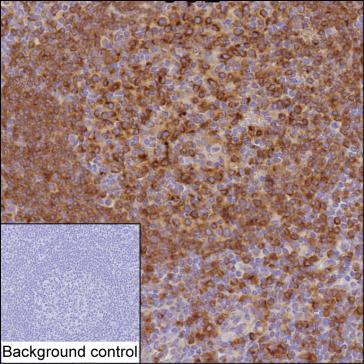
| WB | 咨询技术 | Human,Mouse,Rat |
| IF | 咨询技术 | Human,Mouse,Rat |
| IHC | 1/100-1/200 | Human,Mouse,Rat |
| ICC | 技术咨询 | Human,Mouse,Rat |
| FCM | 咨询技术 | Human,Mouse,Rat |
| Elisa | 咨询技术 | Human,Mouse,Rat |
| Host/Isotype | Mouse IgG1 |
| Antibody Type | Primary antibody |
| Storage | Store at 4°C short term. Aliquot and store at -20°C long term. Avoid freeze/thaw cycles. |
| Species Reactivity | Human |
| Immunogen | Purified recombinant fragment of human STX7 |
| Formulation | Purified antibody in PBS with 0.05% sodium azide |
+ +
以下是关于STX7抗体的3篇参考文献及其摘要概括:
---
1. **文献名称**: "Syntaxin 7 mediates endocytic trafficking to late endosomes"
**作者**: Mullock BM, et al.
**摘要**: 研究利用STX7特异性抗体揭示了Syntaxin 7在内体分选及晚期内体膜融合中的作用,通过免疫沉淀和共聚焦显微镜验证其在运输通路中的定位。
---
2. **文献名称**: "STX7 regulates the stability and activity of the autophagosome-lysosome fusion machinery"
**作者**: Takáts S, et al.
**摘要**: 通过STX7抗体进行免疫印迹和免疫荧光实验,证明STX7在自噬体-溶酶体融合过程中调控SNARE复合物的组装,影响细胞自噬效率。
---
3. **文献名称**: "Role of Syntaxin 7 in lysosomal exocytosis and immune cell function"
**作者**: Andrews NW, et al.
**摘要**: 研究利用STX7抗体阻断实验,发现STX7在免疫细胞(如巨噬细胞)的溶酶体分泌中起关键作用,影响炎症因子释放和病原体清除机制。
---
这些文献均通过STX7抗体探究其功能,涵盖内体运输、自噬及免疫调控等领域。如需具体期刊信息或年份,可进一步补充关键词检索。
The STX7 antibody targets Syntaxin-7 (STX7), a member of the SNARE (soluble N-ethylmaleimide-sensitive factor attachment protein receptor) protein family involved in intracellular membrane fusion events. STX7 is primarily localized to late endosomes and lysosomes, where it facilitates vesicle trafficking and organelle membrane fusion, critical for processes like endosomal sorting, phagosome maturation, and autophagosome-lysosome fusion. Dysregulation of STX7 has been implicated in cellular disorders, including lysosomal storage diseases and immune response defects.
The STX7 antibody is widely used in research to study its expression, subcellular localization, and interactions with other SNARE proteins (e.g., VAMP7. SNAP-23). It is essential in techniques such as Western blotting, immunofluorescence, and immunoprecipitation to explore STX7's role in membrane dynamics and disease mechanisms. Commercial STX7 antibodies are typically raised in hosts like rabbits or mice, validated for specificity against recombinant or endogenous proteins. Recent studies also highlight STX7's potential involvement in cancer progression and neurodegenerative diseases, making its antibody a valuable tool for dissecting pathological pathways. Researchers must validate antibody performance across experimental conditions due to variability in cross-reactivity or batch consistency.
×